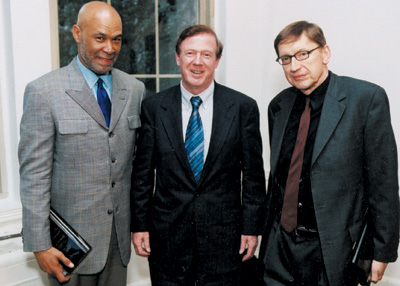 |
 |
 |
 |
|
Around the QuadsO’Meally, Harris Receive Van Doren, Trilling AwardsBY ALEX SACHARE ’71Columbia College students honored Robert G. O’Meally, Zora Neale Hurston Professor of English and Comparative Literature, and William V. Harris, William R. Shepherd Professor of History, as the winners of the Mark Van Doren and Lionel Trilling Awards at Faculty House on May 8.
The awards are bestowed annually by a committee of students who met weekly to consider candidates for the 42nd annual Van Doren teaching award, which honors a faculty member for humanity, devotion to truth and inspiring leadership, and the 28th annual Trilling book award, which recognizes an outstanding book published in the previous calendar year by a member of the College faculty. The committee was co-chaired by Adam Bush ’03, Telis Demos ’04 and Mary Rozenman ’03, and included David Bornstein ’04, Amba Datta ’03, Ben Fishman ’03, Eva Gardner ’04, Joshua Hundert ’05, R.J. Jenkins ’03 and Robert Lee ’03. Both awardees remarked that the honors were special because they were bestowed by students. “I’m very much aware of who gives this prize,” said Harris. “Believe me, faculty members value this award, and I’m moved as well as honored.” Added O’Meally, “To be recognized by your students is something you never forget.” As Dean Austin Quigley, who spoke at the ceremony, put it, “Should we be honored by our students, we are truly honored indeed.” O’Meally is the director of the Center for Jazz Studies at Columbia and teaches courses in African-American literature, humor as an American literary, and jazz and American culture. “He runs his classroom as a jam session. He treats his students as his peers as they riff together,” said Bush in introducing O’Meally. “I find it incredible that you can devote so much time and so much attention to so many students, yet make each one feel that he or she was the only one getting such special, individual attention.” “A great teacher is one who makes his subject swing, so students feel it in their bones and in their hearts as well as in their heads,” observed George Stade, emeritus professor of English and comparative literature. “Robert O’Meally is a great teacher because he makes his subject swing.” O’Meally described his view of the classroom as “an engine of intellectual excitement” and praised the emphasis on teaching at Columbia. “It’s publish or perish, to be sure, but it’s also teach well or perish,” he said. “I’m proud to be in a place like this and salute my colleagues who place such a value on teaching well.” Harris was honored for his book Restraining Rage: The Ideology of Anger Control in Classical Antiquity (Harvard University Press 2002). Drawing on a wide range of ancient texts, and on recent work in anthropology and psychology, Restraining Rage explains the rise and persistence of the concern over the control or elimination of rage. Harris catalogs the authors who wrote on anger control, attempts to find the political elements that inspired their writing and examines anger control in the patriarchal family structure and the master-slave relationship. He concludes by pursuing the evolution of these thoughts in the early Christian traditions. Professor of Classics Suzanne Said described Restraining Rage as “a stimulating book” and Harris as “a man of intellectual curiosity.” And Demos, in introducing Harris, said, “What endeared Restraining Rage to the members of the committee so quickly and so forcefully was the way in which it built upon the required readings of the Core Curriculum. So many of the names and figures in Professor Harris’ history — Homer, Socrates, Plato, Seneca — are so deeply embedded in the consciousness of every Columbia College student that when a book so astonishingly brings these authors to life in a way that suddenly seems relevant to our own world, we can’t help but immediately become engrossed.” In accepting the Trilling award, Harris said, “There are many outstanding books published by Columbia faculty, and having been an unsuccessful candidate for this award in the past, I can say it is extremely gratifying to win.”
|
|
|||||||||||||||||||||||||||||||||||||||||||||||||||||||||
